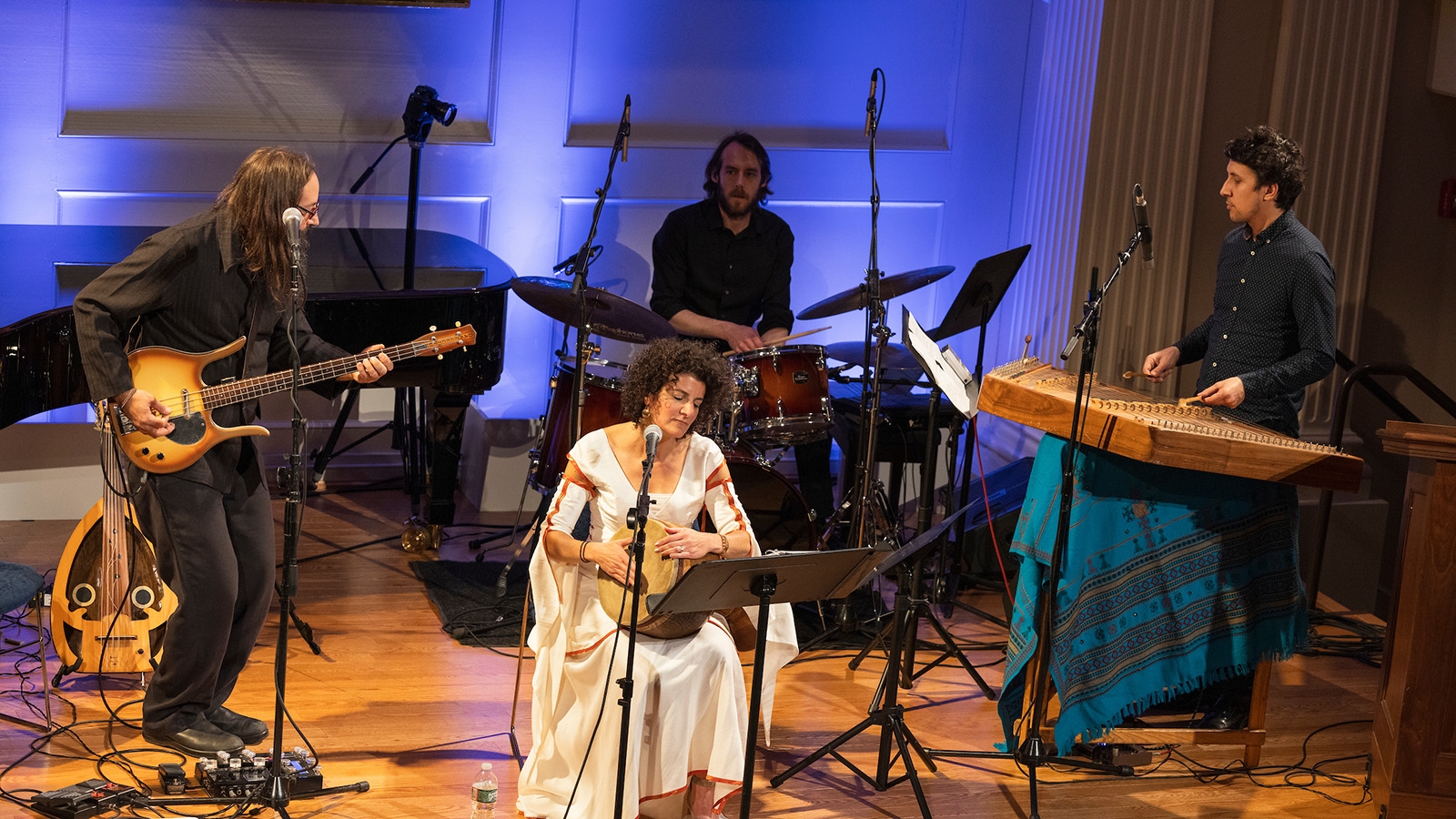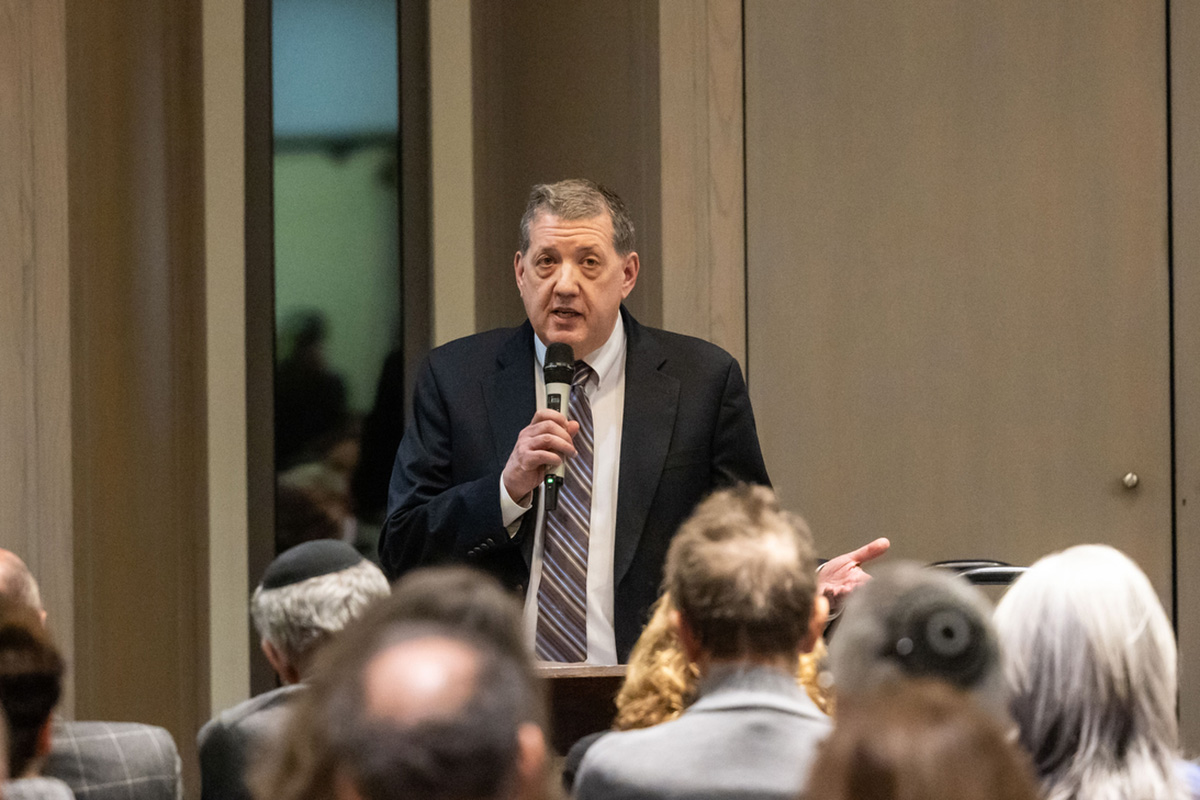“The Next Generation of Scholars”
For three decades, the Katz Center for Advanced Judaic Studies has worked to foster research on Jewish studies and share it with the world.

When Galeet Dardashti sang during a concert celebrating the 30th anniversary of Penn’s Herbert D. Katz Center for Advanced Judaic Studies, she performed a duet with her grandfather, Younes Dardashti. But he wasn’t on stage with her—he had passed away in the early 1990s. Rather, his melody came from one of the few remaining recordings of him performing Jewish prayer music.
“My grandfather was one of the most famous singers of Persian classical music in Iran. He was also Jewish,” says Dardashti, an anthropologist, musician, composer, and member of the most recent class of Katz Center fellows. “It was during a period in the 1950s and ’60s when Jewish people could achieve the highest level of celebrity in Iran. And he was a celebrity.”
The concert, which also included a performance of Yiddish songs lost during World War II then rediscovered, took place in mid-April, capping off a year of music- and sound-focused scholarship by the fellows. It also marked an important milestone for the Katz Center: three decades as a hub for learning about Jewish culture and presenting that knowledge to the world.
“Penn has an excellent Jewish Studies program that offers courses for students. The Katz Center has a distinct mission,” says Steven Weitzman, Ella Darivoff Director of the Katz Center and Abraham M. Ellis Professor of Hebrew and Semitic Languages and Literature in the Department of Religious Studies. “Our sole purpose is to promote new research in Jewish studies and to share that research broadly. The main way we do that is through a fellowship program that brings around 20 scholars to Penn” annually.
There’s also the Jewish Quarterly Review, which the Center puts out, as well as an extensive library that houses a collection with hundreds of thousands of volumes. And this past semester, thanks to a gift from the Goldhirsh-Yellin Foundation, the Katz Center undertook a new initiative to support the understanding of antisemitism that included a free lecture series, “Jews and the University: Antisemitism, Admissions, Academic Freedom.” It was an effort, as the series descriptor put it, to “share insights from history, sociology, education studies, and other fields” to “put the present moment into context and provide understanding far deeper than what social media conveys.”

Steven Weitzman, Ella Darivoff Director of the Katz Center and Abraham M. Ellis Professor of Hebrew and Semitic Languages and Literature in the Department of Religious Studies, has directed the Center for the past decade. (Image: Eddy Marenco)
The Fellowship Takes Shape
The Katz Center evolved out of Dropsie College for Hebrew and Cognate Learning, “the first place in the world one could get a Ph.D. in Jewish studies,” says Weitzman, who has directed the Center for the past decade. “It was the first place in America where you could study Jewish studies in a secular context.” By the mid-1980s, as more institutions began to develop Jewish studies programs, Dropsie became the Annenberg Research Institute, no longer giving out degrees but instead focusing on postdoctoral fellowships. In 1993, it became part of Penn, and in 2008, took on the Katz name in honor of Herbert D. Katz, a philanthropist and former Board chair of the Center.
The Katz Center fellowship is one of the world’s most important engines of new research in Jewish studies, Weitzman says. Each year it focuses on a different theme, one that’s both cutting edge and about which significant and important research has already been conducted. A committee of experts selects the group, aiming for a diverse mix that represents both the United States and the world, as well as senior scholars and early-career researchers.
The most recent cohort of 18 individuals included seven full-year fellows—Penn Associate Professor of Music Mary Channen Caldwell among them—plus 11 during either the fall or spring semester. “We had fellows doing research in many different kinds of Jewish musical culture,” Weitzman says, “ranging from the role of Jews in opera to the way the Jewish voice is represented on the Argentinian stage.
Israeli scholar Hadar Feldman Samet was among this group. During her year at Penn, she worked on a project about Ottoman Jewish music from the 17th century, focusing on an important collection called “New Every Morning.” Feldman Samet, who was also a Katz Center fellow during the 2018-2019 academic year, is a faculty member at the Department of History at Tel Aviv University, where she researches Jews in the Muslim world, specifically Sephardic Jews in the Ottoman Empire.
Our sole purpose is to promote new research in Jewish studies and to share that research broadly.
“The fellowship put together musicologists, ethnomusicologists, historians, scholars who work on aspects of music that are not necessarily the music itself,” Feldman Samet says. “It gave me an opportunity to get to know areas I wouldn’t be exposed to in other contexts.”
Dardashti spent her fellowship time working on a book about the poetry and songs of the Mizrachi, Jews in Israel with a Middle Eastern or North African background. She says she benefited from the close-knit community she found with her co-fellows. “To be in conversation together, to learn from one another, to hear each other’s work, to give each other feedback—it was just such an exciting prospect,” she says. “It was fabulous.”
“We Always Hope to Do More”
Dardashti’s Katz peers got to know her well in an academic context, but when she sang at the anniversary event in April, she revealed another side. “When you know someone in a certain way and then see them do something different and at a high level, it can be shocking. I think it was shocking to my colleagues to see me perform, but it was also fun.”
Plus, she adds, “I got to share this music that is both very Jewish and very Persian at the same time. I’m showing people that’s not a contradiction.”
By chance, the concert took place the day after Iran’s missile attack on Israel. “It was a very tense time, yet this project that I was performing, it captures another moment in time,” Dardashti says, “when being both Jewish and Iranian was much less of a contradiction.”

The Katz Center offered a six-part free lecture series, “Jews and the University: Antisemitism, Admissions, Academic Freedom,” beginning with an event featuring author Dara Horn in conversation with Gabe Greenberg, executive director of Penn Hillel. (Image: Eddy Marenco)
Similarly, the spring lecture series aimed to revisit a prior moment, when Jewish people were first integrated into universities, Weitzman says. “After October 7, we realized we were in a position to create educational opportunities for the public,” he says. The September 2023 gift from the Goldhirsh-Yellin Foundation had established two funds: one for the study of Jewish history and culture in Israel, the other for the study of antisemitism.
The six-part series, which began in January 2024 with a conversation between author Dara Horn and Rabbi Gabe Greenberg, executive director of Penn Hillel, was part of that. “In the lectures, we covered subjects like the past and present of college admission as it relates to Jews—many schools initially had anti-Jewish quotas, but Penn did not—as well as free speech issues,” Weitzman says. “The series gave us a chance to share information from experts about what was happening, really just be a resource.” Another new project studies how kibbutz members in the communities in southern Israel impacted by October 7 are using Jewish religious traditions to address the psychological challenges of recovery.
“We always hope to do more,” Weitzman adds.
Looking ahead, the Center already has the topic—research at the intersection of Jewish studies and medicine—and its 17 individuals selected for the 2024-2025 academic year. (This includes Penn’s Joshua Teplistky, Joseph Meyerhoff Associate Professor of Modern Jewish History.) Publishing the Jewish Quarterly Review will continue, as will a sponsored book series that the Center does with Penn Press and a summer program for graduate students in collaboration with the University of Antwerp and the Hebrew University of Jerusalem.
“We’re working to cultivate the next generation of scholars,” Weitzman says. “David Ruderman was director of the Katz Center before me, and he made it the preeminent place for this type of thinking. I’ve just tried to build on his efforts.” The Center will keep growing and evolving, he adds. Sometimes, like the concert for the Center’s 30th anniversary, that looks like community coming together in thoughtful reflection, set to meaningful music.


